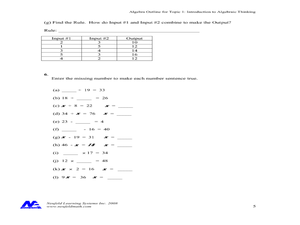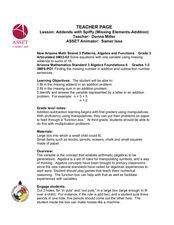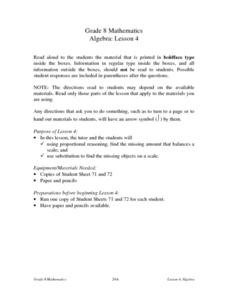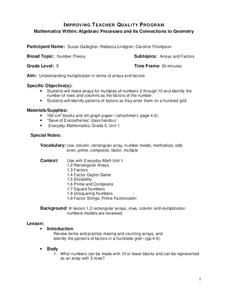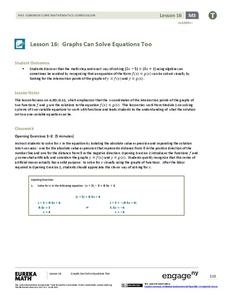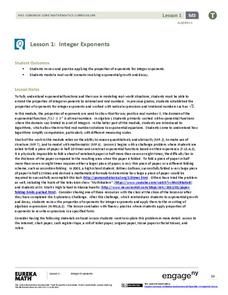Curated OER
Introduction to Algebraic Thinking
In this introduction to algebraic thinking, students perform given calculations. They draw a sequence of pictures to explain the equation. This five page worksheet contains six multi-step problems.
Curated OER
Inequalities and The Order of Operations
Middle and high schoolers investigate how to solve inequalities. The activity has a good guide for taking pupils through a direct instruction of the concept. You can use counting tiles in order to help kinesthetic learners.
EngageNY
The Multiplication of Polynomials
If you can multiply multi-digit integers, you can multiply polynomials. Learners use an area model to compare multiplying numbers to multiplying polynomials. They progress to using the distributive property.
EngageNY
Graphing the Sine and Cosine Functions
Doing is more effective than watching. Learners use spaghetti to discover the relationship between the unit circle and the graph of the sine and cosine functions. As they measure lengths on the unit circle and transfer them to a...
EngageNY
Changing the Base
I can't calculate a base-2 logarithm since my calculator doesn't have a base-2 log key. Young mathematicians use the change of base formula to extend the properties of logarithms to all bases. Among these bases is the natural log base,...
EngageNY
Linear Systems in Three Variables
Put all that algebra learning to use! Using algebraic strategies, learners solve three-variable systems. They then use the three-variable systems to write a quadratic equation given three points on the parabola.
Curated OER
Delivery Trucks
Written to assess students' knowledge of interpreting expressions that represent a quantity in terms of its context, this machine-scored task also allows for a good discussion about units guiding the problem solving and solution.
Curated OER
Algebra I: Linear Functions
Using rates from a rental car company, young mathematicians graph data, explore linear relationships, and discuss the role of slope and the y-intercept. This lesson plan allows for the discussion of independent and dependent variables,...
EngageNY
Addition and Subtraction Formulas 1
Show budding mathematicans how to find the sine of pi over 12. The third lesson in a series of 16 introduces the addition and subtraction formulas for trigonometric functions. Class members derive the formulas using the distance formula...
Curated OER
Integer Algebraic Addition
Students use algebra tiles to solve linear equations with integer solutions. For this algebra lesson plan, students use the additive inverse and the zero pair concept.
Curated OER
Addends with Spiffy
Students solve single variable equations. In this missing addend lesson, students solve problems with missing addends. Students create a function box to help study numerical reasoning.
Curated OER
Who Won the Cross-Country Meet?
Pupils write verbal expressions into algebraic expressions and solve the expressions. They determine who wins a race by determining the algebraic expression.
Curated OER
Algebra I: Multiplying Polynomials and Factoring
Students use concrete models (algebra blocks) to demonstrate their processes for solving quadratic equations. They apply the commutative, associative, and distributive properties to simplify algebraic expressions and to solve quadratic...
Curated OER
Algebra: Lesson 4
Eighth graders participate in using algebraic proportional reasoning to find the missing amount that balances on a scale. Substitution is used to discover the missing objects on a scale. They answer multiple choice questions that are...
Curated OER
Mathematics Within: Algebraic Processes and Its Connections to Geometry
Fifth graders discover the connections between algebra and geometry. With a focus on arrays and factors, they are introduced to multiplication. They develop an array for multiples of 2 through 10 and identify the factors of each row....
Curated OER
Solve Simple One-Step Linear Equation
Sixth graders solve one unknown number by using hands-on manipulatives after being introduced to the history of abstract mathematics through literature.
EngageNY
Putting It All Together
Shuffle 'em up and deal! Learners practice operations with polynomials using cards they pass around the room. The activity works with pairs or individuals, so it offers great flexibility. This is the fifth installment in a series of 42...
EngageNY
Graphs Can Solve Equations Too
There are many equations Algebra I students are not ready to solve. Graphing to solve gives them a strategy to use when they are unsure of an algebraic approach to solve the problem. The lesson exposes learners to a wide variety of types...
EngageNY
Integer Exponents
Fold, fold, and fold some more. In the first installment of a 35-part module, young mathematicians fold a piece of paper in half until it can not be folded any more. They use the results of this activity to develop functions for the area...
EngageNY
Recursive Formulas for Sequences
Provide Algebra I learners with a logical approach to making connections between the types of sequences and formulas with a lesson that uses what class members know about explicit formulas to develop an understanding of recursive formulas.
EngageNY
The Definition of a Parabola
Put together the pieces and model a parabola. Learners work through several examples to develop an understanding of a parabola graphically and algebraically.
EngageNY
Bacteria and Exponential Growth
It's scary how fast bacteria can grow — exponentially. Class members solve exponential equations, including those modeling bacteria and population growth. Lesson emphasizes numerical approaches rather than graphical or algebraic.
EngageNY
Four Interesting Transformations of Functions (Part 3)
Continue the study of transformations with an examination of horizontal stretches, shrinks, and reflections. Individuals use the same process used in parts one and two of this series to examine horizontal changes. The resource also...
EngageNY
Modeling with Exponential Functions
These aren't models made of clay. Young mathematicians model given population data using exponential functions. They consider different models and choose the best one.


